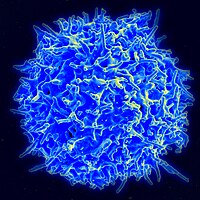
Photo from wikipedia
Immune checkpoint inhibitors (ICI) represented a step forward in improving the outcome of patients with various refractory solid tumors and several therapeutic regimens incorporating ICI have already been approved for… Click to show full abstract
Immune checkpoint inhibitors (ICI) represented a step forward in improving the outcome of patients with various refractory solid tumors and several therapeutic regimens incorporating ICI have already been approved for a variety of tumor entities. However, besides remarkable long-term responses, checkpoint inhibition can trigger severe immune-related adverse events in some patients. In order to improve safety of ICI as well as T cell therapy, we tested the feasibility of combining T cell-based immunotherapy with genetic disruption of checkpoint molecule expression. Therefore, we generated H-Y and ovalbumin antigen-specific CD8+ T cells with abolished PD-1, LAG-3, and TIM-3 expression through CRISPR/Cas9 technology. CD8+ T cells, subjected to PD-1, LAG-3, and TIM-3 genetic editing, showed a strong reduction in immune checkpoint molecule expression after in vitro activation, while no relevant reduction in responsiveness to in vitro stimulation was observed. At the same time, in B16-OVA tumor model, transferred genetically edited OT-1 CD8+ T cells promoted longer survival compared to control T cells and showed enhanced expansion without associated toxicity. Our study supports the notion that antigen-specific adoptive T cell therapy with concomitant genetic disruption of multiple checkpoint inhibitory receptors could represent an effective antitumor immunotherapy approach with improved tolerability profile.
Journal Title: International Journal of Molecular Sciences
Year Published: 2022
Link to full text (if available)
Share on Social Media: Sign Up to like & get
recommendations!